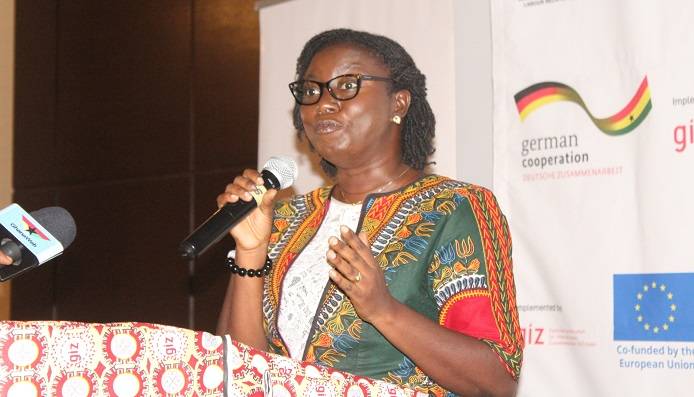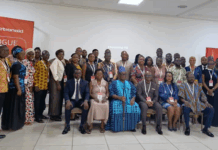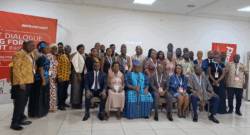…as WHO estimates 2.3 million Ghanaians are living with various mental health conditions
A Specialist Psychiatrist at the Accra Psychiatric Hospital, Dr. Peggy Asiedu Ekremet, has noted that more funds and experts are needed to improve mental health care in the country.
The World Health Organisation (WHO) has estimated that 2.3 million Ghanaians are living with various mental health conditions. These conditions include mild, moderate and severe psychological disorders – fear, stress anxiety, depression, bipolar disorder and Post-Traumatic Stress Disorder (PTSD).
With this worrying concern, Dr. Asiedu Ekremet said experienced experts are leaving the field to work in other countries because of the conditions associated to work here, a situation she said is creating a gap in the system.
“This year we want to drum home the point that having good health which includes mental health is a human right. Generally, the issue of mental health has been brought to the forefront. The awareness is increasing and we are doing our best to provide the best possible care to people but we all know that there is still some more we could do in terms of human resources.
“We do not have enough nurses, psychiatrists and psychologists to cover the whole of the nation and unfortunately, some experienced people are also leaving the country for greener pastures. We still have a gap. We have to train more experts to fill that gap and also funding is needed,” she said.
She raised this concern at a public forum organised by the Ghanaian-European Centre for Jobs, Migration and Development and the German International Cooperation Agency (GIZ) on mental health held in Accra to mark the global commemoration of this year’s World Mental Health Day themed “Mental health is a Universal human right.”

She added that: “All over the world, it is noted that one in eight people are living with mental health conditions. Adolescents and young people are increasingly being affected by these conditions and 1 in 7 of them are affected. When we come to children and adolescents below the age of 19 years, 1 in every 5 of them has a recognizable and treatable mental disorder. And data has it that 50% of mental illness in adults would have started before the age of 14 years. These statistics are very alarming and show us that having a mental illness is closer than we can imagine and thus we must protect our mental health.”
She assured that the Mental Health Authority is committed to ensuring that every Ghanaian has the right to quality mental health and is working hard to ensure all regions have crisis management teams.
“We have established a call centre at the Authority to receive calls and help when people are in crises or are feeling suicidal. This is a toll-free number which is 0800678678,” she said.

For his part, a Component Manager at the Ghanaian-European Centre for Jobs, Migration and Development (GEC), Michael Kwaku Yeboah indicated that mental health care in the country remains a challenge, with a 98% treatment gap.
He however called on stakeholders in Ghana’s mental health space to deliberate on ways to improve access to mental health care, systems, and facilities without discrimination and human rights violations.
“Mental health is crucial to personal, community and socio-economic development. Thus, the absence of good mental health, means one cannot make decisions, build relationships and contribute to shaping the world,” he stressed.
He affirms GIZ and GEC’s commitment to continue to raise awareness of mental health issues in Ghana and to mobilize efforts in support of mental health.
He said they will continue to collaborate with stakeholders working on mental health issues to talk about what more is needed to be done to make mental health care a reality for people in Ghana.
GEC and GIZ’s role
“We at GIZ Ghana are working to shape a future worth living in Ghana, which is why we provide mental health and psychosocial support to our clients at the Ghanaian-European Centre for Jobs, Migration and Development. Through counselling, psychotherapy sessions, temporary accommodation and healthcare, we ensure successful reintegration for returned migrants, who suffer various mental disorders and conditions along the migration cycle. We also provide support to vulnerable persons including persons with disabilities, unemployed youth, and women.
“Since the Centre opened in December 2017, we have provided psychosocial support to about 3,436 persons, including 927 women. We also encourage peer-to-peer counselling. By encouraging and supporting returned migrants to take the lead on some of our employment promotion interventions in 16 communities in the Bono, Bono East and Ahafo regions, we not only have provided socioeconomic prospects, but we have also helped to reduce the stigma they often suffer when they return to their communities. Their involvement in these projects also speeds up their mental well-being.
“I wish to appeal to you all to work harder to dispel myths, reduce stigma and eliminate discrimination related to mental health conditions. A person’s mental state should not influence how they are especially excluding them from decisions about their own health. Their human rights should not be violated neither should they be discriminated against in their quest to access care,” he added.










